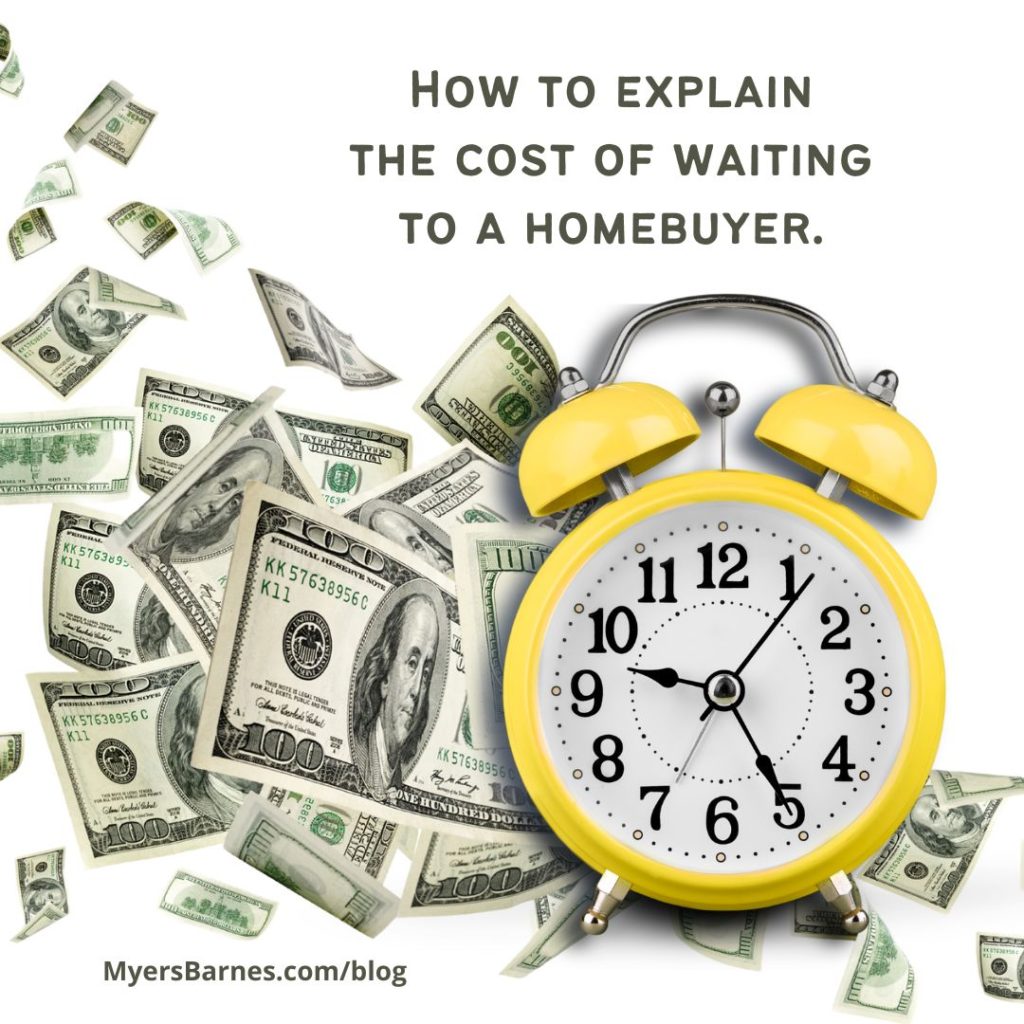 Do you have prospective buyers who seem truly interested but then come back to you with, “We’ve decided to put this on pause for awhile.” You’re not surprised, but disappointed. But do you let them leave? Do you know how to explain the cost of waiting to a homebuyer? Here’s some help.
Do you have prospective buyers who seem truly interested but then come back to you with, “We’ve decided to put this on pause for awhile.” You’re not surprised, but disappointed. But do you let them leave? Do you know how to explain the cost of waiting to a homebuyer? Here’s some help.
What are you waiting for?
This is the logical next question. Lob the ball back into their court. Dig deeper to find out why they’re not going to buy right now.
The real reason isn’t just the interest rate, affordability, the fluctuating housing market, or the home you’re presenting. They’re waiting because they’re uncertain.
Things have changed tremendously in the past two years. People who had no plans to buy a home in 2019 suddenly realized it was a necessity in 2020 and 2021. The interest rate hit an all-time low in 2020, making affordability higher than ever for a majority of new homebuyers.
That’s not the case right now. The most eager of homebuyers have purchased their new homes. The late arrivals are facing a higher interest rate along with higher home prices. They’re uncertain about buying right now because they’re wondering what’s coming. Will it get more affordable if they wait?
You know the truth. We’re not going to see sub-3% rates again in the foreseeable future, if ever. And housing prices will rise, as they always do, keeping pace with inflation and market value.
Now, you need to explain this truth to your buyer who hasn’t yet achieved certainty.
In other words, you have more selling to do.
It’s time to have that tough conversation.
Let’s work through the conversation.
“We decided to go on pause for the moment.”
They’re uncertain. It’s not a hard and fast “no” but it’s a “not now” unless you respond correctly.
“Respectfully, may I ask why?” I love to insert “respectfully”. It somehow softens my boldness.
“We’re just looking at the situation, which is changing, and we’re wondering if the interest rates are going back down.” When your customer squirms, by the way, it’s a sign of their uncertainty. They don’t have conviction in the decision to wait.
“Unfortunately, that doesn’t seem at all likely. Feds are meeting again later this month and it’s realistic to expect that the interest rates will go up again.”
“But it might go the other way.”
Wow. Time to push harder.
“Listen, I truly understand your uncertainty. But it took 51 years for the rates to do what they did. What we saw in the last two years was a tiny blip on the radar, a fluke that arose from the perfect storm that no one could have predicted. The entire country shut down. People were out of work. Many were terribly sick and unable to pay bills. The government responded. We’ve returned to a pre-COVID culture, for the most part. The housing market is correcting itself to where it would have been if not for that blip.”
I recommend that you deliver this explanation as pleasantly as possible. Be calm and relay the reality without preaching or dismissing their angst.
In some cases, the buyer delayed the purchase in order to save up more money for the down payment, to avoid the PMI. But while these people are trying to outswim the big wave, they just can’t paddle fast enough to save, what, another $10K? Trying to time the market is a risky gamble. I’ve seen people try. I tried it myself. It rarely delivers the desired result.
Respond or react?
Don’t focus on the fact that your buyer is pausing. Apply your emotional intelligence to learn the cause of their uncertainty. Be empathetic to the difficulty they’re facing. When they recognize that you care more about their needs than the sale, they’ll listen more openly. When they listen, they learn.
Here’s something I learned during my cancer treatment. I had a bad reaction to a medication. The side effects were horrific. It wasn’t a conscious choice to feel this way. It was a reaction.
My doctor adjusted the treatment. He checked with me a few days later to see how I was feeling. There was a definite improvement. “Great!” I told him happily.
“Good. You’re responding to the new treatment.”
A reaction is almost involuntary. A response is crafted.
As a new home sales professional, it’s your job to educate a buyer. You respond to their questions—not spontaneously reacting—and guide them to the right home choice. Convert uncertainty to certainty and you will close the sale for a happy homebuyer.


